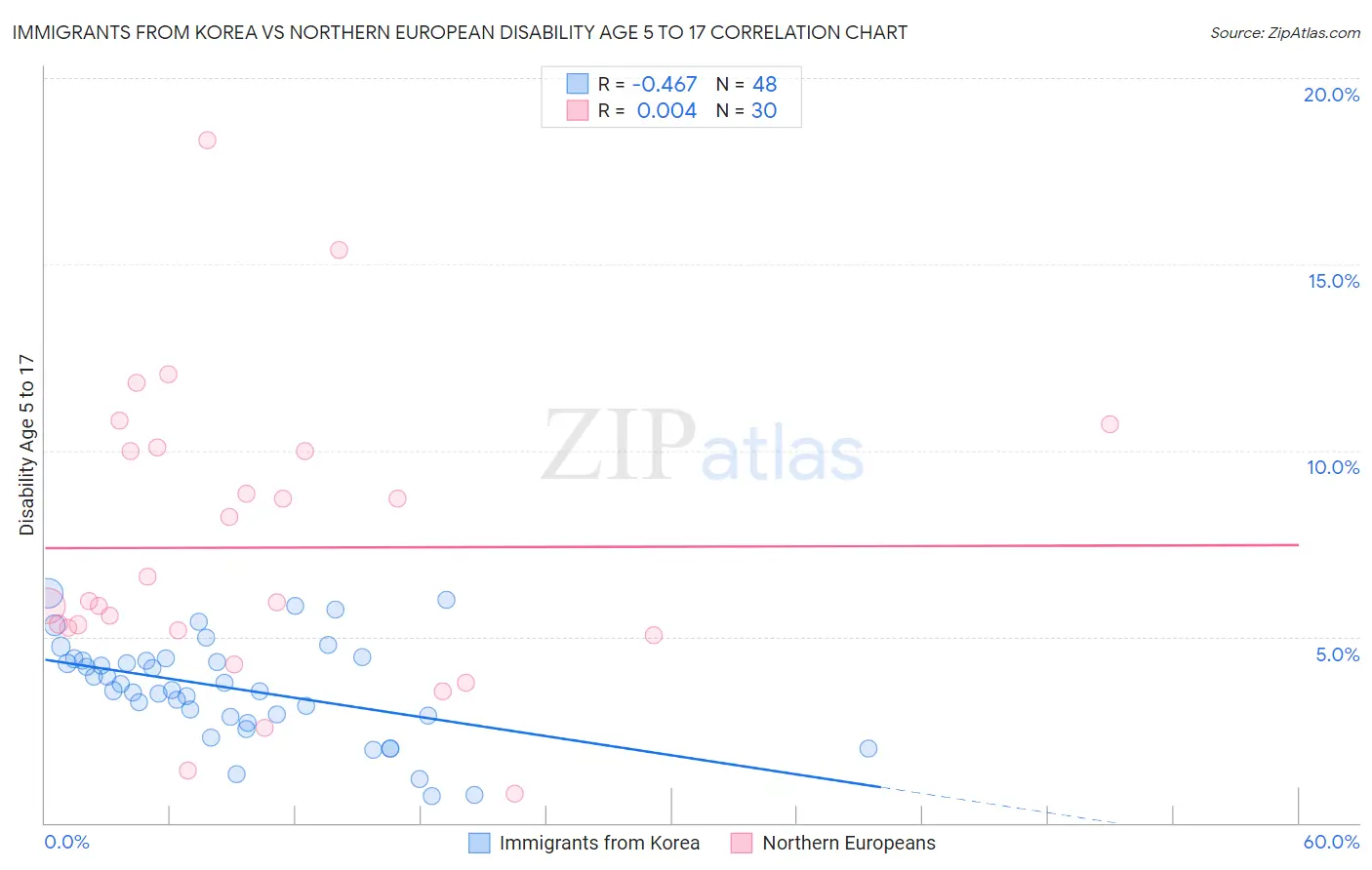Immigrants from Korea vs Northern European Disability Age 5 to 17
COMPARE
Immigrants from Korea
Northern European
Disability Age 5 to 17
Disability Age 5 to 17 Comparison
Immigrants from Korea
Northern Europeans
4.7%
DISABILITY AGE 5 TO 17
100.0/ 100
METRIC RATING
14th/ 347
METRIC RANK
5.7%
DISABILITY AGE 5 TO 17
15.2/ 100
METRIC RATING
199th/ 347
METRIC RANK
Immigrants from Korea vs Northern European Disability Age 5 to 17 Correlation Chart
The statistical analysis conducted on geographies consisting of 412,408,030 people shows a moderate negative correlation between the proportion of Immigrants from Korea and percentage of population with a disability between the ages 5 and 17 in the United States with a correlation coefficient (R) of -0.467 and weighted average of 4.7%. Similarly, the statistical analysis conducted on geographies consisting of 401,696,711 people shows no correlation between the proportion of Northern Europeans and percentage of population with a disability between the ages 5 and 17 in the United States with a correlation coefficient (R) of 0.004 and weighted average of 5.7%, a difference of 22.0%.

Disability Age 5 to 17 Correlation Summary
| Measurement | Immigrants from Korea | Northern European |
| Minimum | 0.73% | 0.78% |
| Maximum | 6.2% | 18.3% |
| Range | 5.4% | 17.5% |
| Mean | 3.6% | 7.4% |
| Median | 3.6% | 5.9% |
| Interquartile 25% (IQ1) | 2.9% | 5.2% |
| Interquartile 75% (IQ3) | 4.4% | 10.0% |
| Interquartile Range (IQR) | 1.5% | 4.8% |
| Standard Deviation (Sample) | 1.3% | 3.9% |
| Standard Deviation (Population) | 1.3% | 3.9% |
Similar Demographics by Disability Age 5 to 17
Demographics Similar to Immigrants from Korea by Disability Age 5 to 17
In terms of disability age 5 to 17, the demographic groups most similar to Immigrants from Korea are Chinese (4.7%, a difference of 0.20%), Immigrants from Singapore (4.7%, a difference of 0.63%), Thai (4.7%, a difference of 0.70%), Arapaho (4.7%, a difference of 1.1%), and Immigrants from South Central Asia (4.7%, a difference of 1.1%).
| Demographics | Rating | Rank | Disability Age 5 to 17 |
| Immigrants | China | 100.0 /100 | #7 | Exceptional 4.5% |
| Indians (Asian) | 100.0 /100 | #8 | Exceptional 4.6% |
| Immigrants | Eastern Asia | 100.0 /100 | #9 | Exceptional 4.6% |
| Immigrants | India | 100.0 /100 | #10 | Exceptional 4.6% |
| Armenians | 100.0 /100 | #11 | Exceptional 4.6% |
| Iranians | 100.0 /100 | #12 | Exceptional 4.6% |
| Thais | 100.0 /100 | #13 | Exceptional 4.7% |
| Immigrants | Korea | 100.0 /100 | #14 | Exceptional 4.7% |
| Chinese | 100.0 /100 | #15 | Exceptional 4.7% |
| Immigrants | Singapore | 100.0 /100 | #16 | Exceptional 4.7% |
| Arapaho | 100.0 /100 | #17 | Exceptional 4.7% |
| Immigrants | South Central Asia | 100.0 /100 | #18 | Exceptional 4.7% |
| Immigrants | Uzbekistan | 100.0 /100 | #19 | Exceptional 4.8% |
| Burmese | 100.0 /100 | #20 | Exceptional 4.8% |
| Yup'ik | 100.0 /100 | #21 | Exceptional 4.8% |
Demographics Similar to Northern Europeans by Disability Age 5 to 17
In terms of disability age 5 to 17, the demographic groups most similar to Northern Europeans are Icelander (5.7%, a difference of 0.060%), Basque (5.7%, a difference of 0.15%), Austrian (5.7%, a difference of 0.20%), Spanish American Indian (5.7%, a difference of 0.24%), and Paiute (5.7%, a difference of 0.42%).
| Demographics | Rating | Rank | Disability Age 5 to 17 |
| Immigrants | Bosnia and Herzegovina | 26.3 /100 | #192 | Fair 5.7% |
| Immigrants | Canada | 26.1 /100 | #193 | Fair 5.7% |
| Croatians | 23.6 /100 | #194 | Fair 5.7% |
| Immigrants | Nigeria | 23.4 /100 | #195 | Fair 5.7% |
| Inupiat | 23.3 /100 | #196 | Fair 5.7% |
| Immigrants | North America | 23.1 /100 | #197 | Fair 5.7% |
| Norwegians | 20.9 /100 | #198 | Fair 5.7% |
| Northern Europeans | 15.2 /100 | #199 | Poor 5.7% |
| Icelanders | 14.6 /100 | #200 | Poor 5.7% |
| Basques | 13.7 /100 | #201 | Poor 5.7% |
| Austrians | 13.2 /100 | #202 | Poor 5.7% |
| Spanish American Indians | 12.8 /100 | #203 | Poor 5.7% |
| Paiute | 11.2 /100 | #204 | Poor 5.7% |
| Trinidadians and Tobagonians | 10.8 /100 | #205 | Poor 5.7% |
| Immigrants | Africa | 10.8 /100 | #206 | Poor 5.7% |